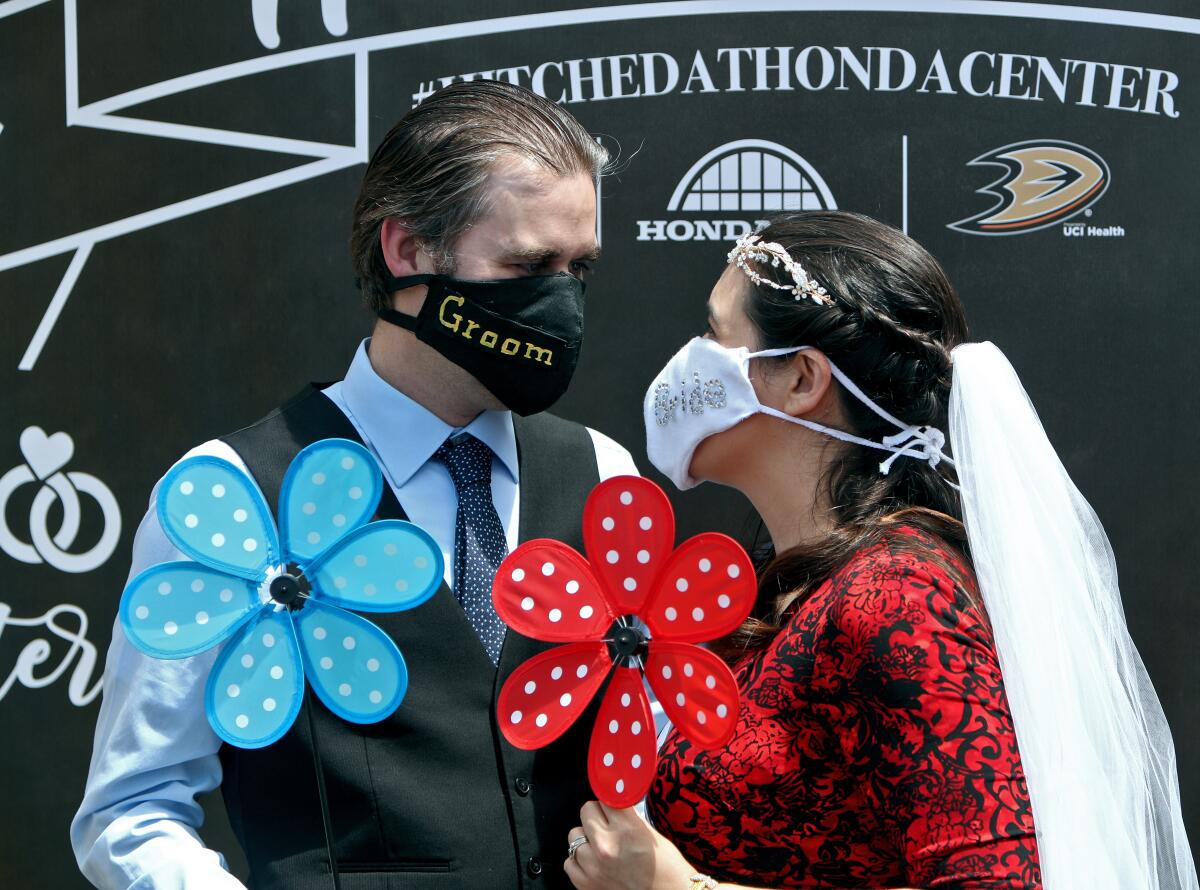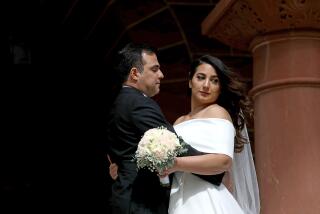How to get legally married during the coronavirus crisis

- Share via
Instead of a bouquet, a masked bride holds a bottle of Corona beer in her Instagram wedding photo. A groom gamely wields a can of disinfectant. It’s hard to tell if anyone is blushing behind the masks. Marriage in the time of coronavirus, like many aspects of life, has changed.
Couples in Southern California looking to say “I do” before the pandemic hit had plenty of options. For a fee, a wedding planner could handle everything from the flowers to the vows. Or the couple could sprint down to the courthouse themselves for a quick civil marriage.
Now, tying the knot has become more complex. How do you get a marriage license? Can you get a marriage license?
Here’s how it works now, and in some cases doesn’t, in Southern California.
Can I get married?
Yes, it is still possible for couples to get legally married in California. However, every county is approaching the situation differently — making it difficult depending on where you live and what your health, transportation access and various deadlines dictate.
First, get a license
To be legally married, a couple must obtain a valid marriage license. It’s a legal document typically issued by the county in which the couple gets married. Some counties allow specially trained notaries to issue licenses as well. Once received, the license must be solemnized with a ceremony conducted by someone recognized as having the legal power do so. It’s then filled out and signed by the couple and officiant — and one or two witnesses if it’s a public marriage — and sent to the county clerk’s office.
One of the biggest obstacles right now is getting the physical license. In mid-March, many county clerk offices across the state closed in response to the spreading coronavirus. Hundreds, if not thousands, of appointments for marriage licenses were canceled, postponed or otherwise thrown into confusion.
Many counties have since begun to offer some way to get a license. Check with the clerk’s office before attempting to go in person.
Los Angeles County, notably, has not issued licenses since closing its offices March 16 and likely will not do so for several more weeks.
Orange County on April 20 began issuing licenses and performing ceremonies by appointment in an Anaheim parking lot. The county is now booked through June 2. County clerk-recorder Hugh Nguyen said the county expects to hand out 3,800 licenses by that date.
Riverside County started offering licenses and performing ceremonies by appointment beginning April 24. At least one member of the couple applying for the license must live in Riverside County.
Ventura County has started offering licenses and ceremonies by appointment. At least one member of the couple applying for the license must live in the county.
Are there virtual ceremonies?
On April 30, Gov. Gavin Newsom signed an executive order allowing couples to legally wed through videoconferencing during the pandemic.
This order didn’t suddenly make ad hoc Zoom weddings legally binding. But it gave county clerks the discretion to develop a teleconference system through which marriage licenses could be issued and civil ceremonies could be performed.
Teleconferencing could allow people who can’t obtain a license in person — because of mobility or health reasons, such as not having a car or being at high risk for contracting COVID-19 — the opportunity to legally wed. Others may need to get married quickly to access healthcare through a spouse or to stay in the country as their visa expiration date nears.
Some counties, including Ventura and San Diego, are offering in-person services and have decided not to develop a teleconference system.
L.A. County plans to roll out a system, but there’s no set launch date. It may take until June to get started, county clerk spokesman Mike Sanchez said.
Meanwhile, Riverside County’s first teleconference wedding was held Thursday, according to assistant county Clerk-Recorder Michele Martinez-Barrera.
Orange County’s system is being tested and could roll out next week, Nguyen said.
You aren’t going virtual and can get a license. Now what?
The quickest option is to get married at the same time the license is issued. A county employee can officiate, and in some cases another employee can serve as witness. All parties sign the document and the whole legal part of the marriage is finished. (Riverside County is mandating that couples who use its teleconference wedding service must have the ceremony performed at the same time.)
If you have a marriage license but want a ceremony beyond what a particular county offers, you have options.
Just as in pre-pandemic times, those who can officiate a wedding in California include priests, rabbis, imams, medicine men or other types of religious leaders, as well as nondenominational ordained ministers. Other types of people who have the power to tie the knot include judges and justices of the peace.
What’s changed is that many churches, synagogues and mosques have stopped hosting ceremonies on-site. Many courthouses are similarly closed or offering limited access to the public. Those determined to be married according to the rites of a specific religion — or anywhere outside the clerk’s office — need to find a priest, rabbi or nondenominational officiant willing to make a house call, meet in an open public place or otherwise accommodate the necessary social distancing.
Many professional wedding officiants are still offering their services, with modifications such as curbside license signing.
Important deadlines
All wedding licenses in California expire within 90 days of when they are issued by the county. For authorized notaries, the clock starts ticking from the time they receive the license from the county.
Once the marriage is officiated, the license needs to be received by the county it was issued in within 10 days. Often, the officiant sends in the paperwork for the couple, but couples can as well.
You have a license, but you want to postpone
Those who have a license but are no longer itching to get hitched within the 90-day time frame can simply let it expire.
The expiration date can’t be extended — it’s written into state law. That means couples who want to wait more than 90 days to have their marriage made official will need to get a new license.
L.A. County clerk’s office officials are in talks with the state about whether fees for new licenses will be waived or refunds for expired licenses will be issued. “But nothing has been set in stone,” Sanchez said.
According to Rabbi Jonathan Aaron of Temple Emanuel of Beverly Hills, the majority of couples who were scheduled to marry at the synagogue in coming weeks have postponed for a year or more.
“No one wants to have a marriage ceremony that no one can attend,” said Chris Robinson, a wedding services professional in Los Angeles.
Alyce Barrick, a wedding planner with Laurel & Fey, said she has encouraged couples to downsize if they aren’t postponing. She expects extravagant affairs to make a comeback though: “2021 is going to be insane.”
More to Read
Sign up for The Wild
We’ll help you find the best places to hike, bike and run, as well as the perfect silent spots for meditation and yoga.
You may occasionally receive promotional content from the Los Angeles Times.











